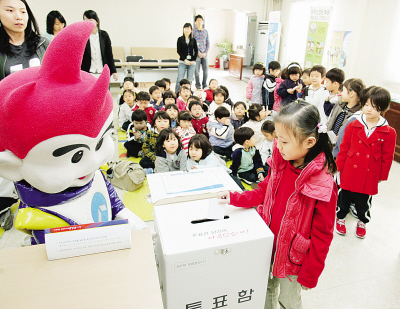Children Have a Say
chinagate.cn by Bu Wei, November 25, 2014 Adjust font size:

The implementation of the right to be heard in different settings and situations
What kind of matters can children participate in? Generally speaking, the areas of children’s participation include home, school, work, community, region, country and international level, etc.
Home: At home, children are often taken as the ones to be looked after. Yet, as they grow up, children can participate in household chores, family discussion and decisions about their own matters suitable for their age. In addition, parents should listen to children’s opinions when settling disputes over property or childrearing in case of a divorce. Outside the family, the law court or people concerned should respect children’s thoughts.
School: In school, Children’s participation is indispensable for the creation of a social climate in the classroom, which stimulates cooperation and mutual support needed for child centred interactive learning. Children can develop their organizations to express their views and needs on curriculum arrangement, school’s daily activities, school management, school rules, making a school for all children rather than a school merely for “good” children; and making all children the masters of learning and able to apply what they learn in a particular field.
Work: Chinese law provides that children aged 16 can work and do safe labor. Like in other countries, work and household labor is also an important part of life for rural children, including left-behind and migrant children. Working children have a right to be protected by law against exploitation and should be heard when worksites and conditions of work are examined by inspectors investigating the implementation of labour laws. Children and, if existing, representatives of working children’s associations should also be heard when labour laws are drafted or when the enforcement of laws is considered and evaluated.
Community: Almost all children live in the community. Children should be supported and encouraged to form their own child-led organizations, and community media, which will create space for meaningful participation. In addition, children can contribute their perspectives, for example, on the design of schools, playgrounds, parks, leisure and cultural facilities, public libraries, health facilities and local transport systems in order to ensure more appropriate services. In community development plans that call for public consultation, children’s views should be explicitly included.
Region and country levels: Some countries and regions take such forms as children’s committee and children’s council to ensure children’s opinions and suggestions about their own matters are valued, including in the process of legislation. In 2003, sponsored by UNICEF Hong Kong Committee, Against Child Abuse and Hong Kong Committee on Children’s Rights, a children’s council was set up in Hong Kong, which gained support and financial aid from the Bureau of Civil Affairs. Its purpose is to let children discuss children-related issues in a democratic way for government reference. Also, different groups of children can be organized up to protect their own rights. For example, “Brazilian Movement for Homeless Children” has become a model of children’s participation. In July 2007, ACWF, IOL, UNICEF, the Project Office of UN Inter-Agency Project on Human Trafficking in the Greater Mekong Sub-region, and Save the Children met in Beijing and jointly held a forum on anti-trafficking in children. At this forum, children’s representatives requested the government to build more activity places for migratory, stay-at-home and poverty-stricken children, provide information service and job skills training free of charge, and that the community should pay visits to the stay-at-home children, and provide opportunities of work-study programs for poor children.
Regional and international levels: In 2002, representatives of Chinese children attended the Asia-Pacific Regional Conference on Children, and the UN General Assembly Special Session on Children which was held in New York. UNICEF encourages States parties and NGOs to support the children to express their opinions.
However, in China, children’s participation still faces some big challenges. Influenced by traditional culture and other factors, the decision-making authorities, the educational workers, and the public lack for awareness and sensibility of children’s rights and children’s participation. The adults should learn how to work together with children. Rural children, children and other vulnerable children are often the target people to be cared for, but it is difficult to hear their voices. Also, all children need to increase their capability of participation. Moreover, there is no existing system or mechanism to guarantee children’s participation, for instance, in what way to ensure that we can hear children’s voices and thus promote changes; how to make children know the procedures of decision-making authorities like NPC and CPPCC, or how to make these procedures adapt to children’s needs. Children’s participation does not mean that adults occasionally think of giving children an opportunity to speak, but that they should form a mechanism and a culture.
Since 1991, for response on these challenges, ACWF, some national departments, and NGOs conducted many training workshop on children’s participation for children and adults, aiming at increasing the public knowledge and awareness of children’s participation for social change. With the popularization of CRC, we believe that we will eventually be able to create a social environment in which people respect and encourage children’s participation.
(The author is a professor at the Research Center for Children and the Media, the Institute of Journalism and Communication of CASS)


